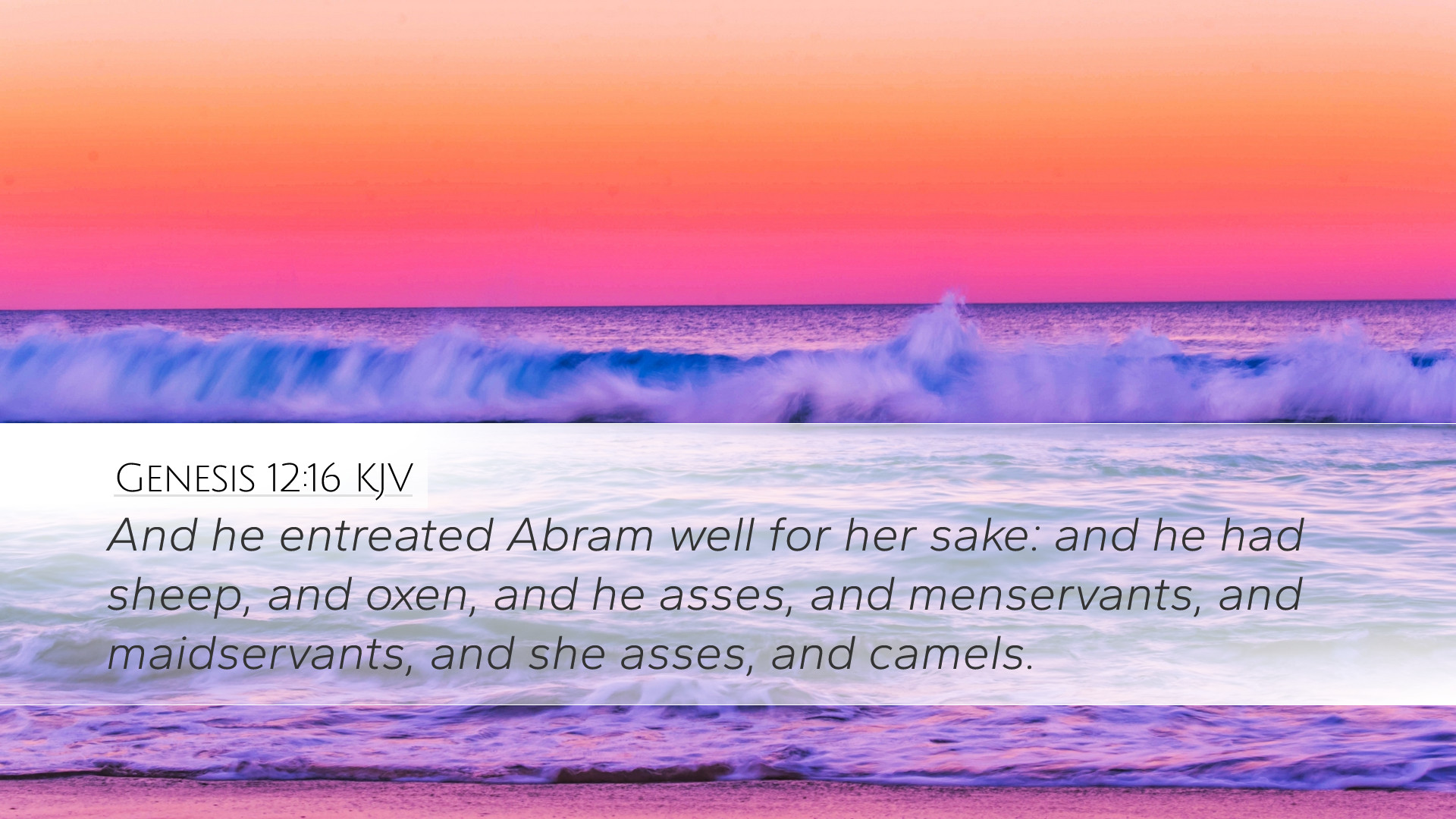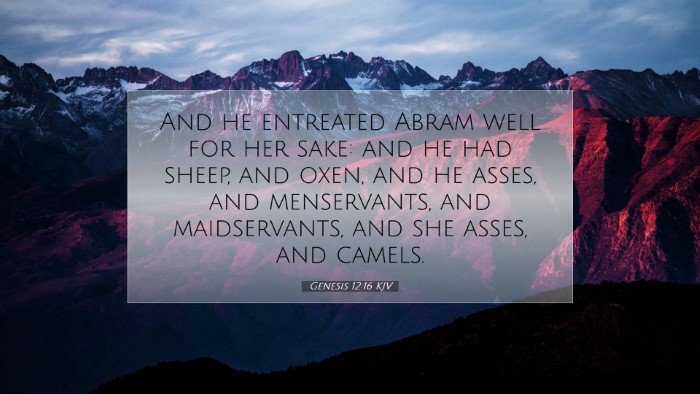Commentary on Genesis 12:16
Genesis 12:16 states, "And he entreated Abram well for her sake: and he had sheep, and oxen, and heasses, and menservants, and maidservants, and she asses, and camels."
Overview
This passage details the experience of Abram in Egypt and the blessings he received as a result of Sarai, his wife, being taken into Pharaoh's household. It reveals significant socio-cultural dynamics in ancient times, showing how women were viewed and the economic transactions that occurred between individuals and nations.
Insights from Public Domain Commentaries
Matthew Henry's Commentary
Matthew Henry emphasizes the implications of Sarai's beauty and the favor that Abram received due to her presence. He notes that:
- Divine Providence: Abram's sojourning in Egypt was not merely a human decision but an occurrence allowed by God. Henry remarks on how God often turns unfavorable situations into blessings for those who trust in Him.
- Material Blessings: Henry points out that though Abram was placed in a morally perilous situation, he was enriched because of Sarai's beauty. This speaks to how God's favor can bring about prosperity even in adverse conditions.
- Contrast of Morality: The favor shown to Abram contrasts sharply with the moral implications of why Sarai was taken. Henry highlights the ethics surrounding deceit and how even the righteous can suffer repercussions from actions taken to preserve their own lives.
Albert Barnes' Commentary
Albert Barnes provides an insightful analysis of the motivations behind Pharaoh's actions. He states that:
- Political Alliances: The acquisition of Sarai by Pharaoh may have been seen as a political alliance, which was common in ancient cultures. Pharaoh treating Abram well indicates a method of securing loyalty.
- Economic Transactions: Barnes notes the nature of the gifts bestowed upon Abram, which include livestock and servants. This signifies the understanding of wealth and status portrayed in human society.
- Theological Implications: Barnes argues that God’s intervention is marked by the fact that despite Abram’s deceitful stratagem, he was nevertheless protected. This reflects God's overarching sovereignty, assuring readers that humans may fail, but God remains faithful to His people.
Adam Clarke's Commentary
Adam Clarke elaborates on various cultural and historical aspects in understanding this passage:
- Cultural Context: Clarke points out that during this period, it was not uncommon for rulers to take women from their husbands, viewing such an act as within their rights due to their power. It emphasizes the importance of understanding biblical stories within their cultural contexts.
- Sarai's Role: Clarke stresses the position of Sarai not only as a wife but also as a significant figure within the narrative. Her beauty led to both her abduction and ultimately to God's protection over Abram.
- God's Protection: Clarke highlights that the passage underscores God’s providential care. While Abram acted out of fear, God's plan transcended human actions, showcasing His ability to shape events for the good of His people.
Theological Reflections
This verse stimulates numerous theological reflections appropriate for pastors and students:
- God's Sovereignty: The events in Genesis 12:16 demonstrate God’s sovereignty over human affairs. Even in moments of folly and error, God's purposes are achieved.
- Faith and Fear: Abram’s actions stem from fear rather than faith. It serves as a reminder for believers today to trust God's promises rather than succumb to earthly fears.
- The Nature of Blessings: Blessings can come in various forms, even in complex situations. Understanding the nature of blessings can transform our views on wealth and well-being in a faith context.
Practical Applications
Certain lessons can be drawn from this passage which can be beneficial for contemporary application:
- Trust in God: In times of uncertainty, it is crucial to lean on faith in God's faithfulness rather than devising our own plans.
- Moral Integrity: The moral implications surrounding Abram’s actions remind readers of the importance of integrity, even when faced with challenging circumstances.
- Value of Relationships: This passage encourages believers to prioritize relationships and the sanctity of marriage, highlighting how they can be placed at risk through fear-based decisions.
Conclusion
Genesis 12:16 offers rich insights into human dynamics, divine providence, and moral teachings. By reflecting on the insights provided by esteemed commentaries, pastors, students, and theologians can extract deep theological truths and practical wisdom that is applicable even in today's context.


